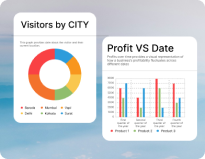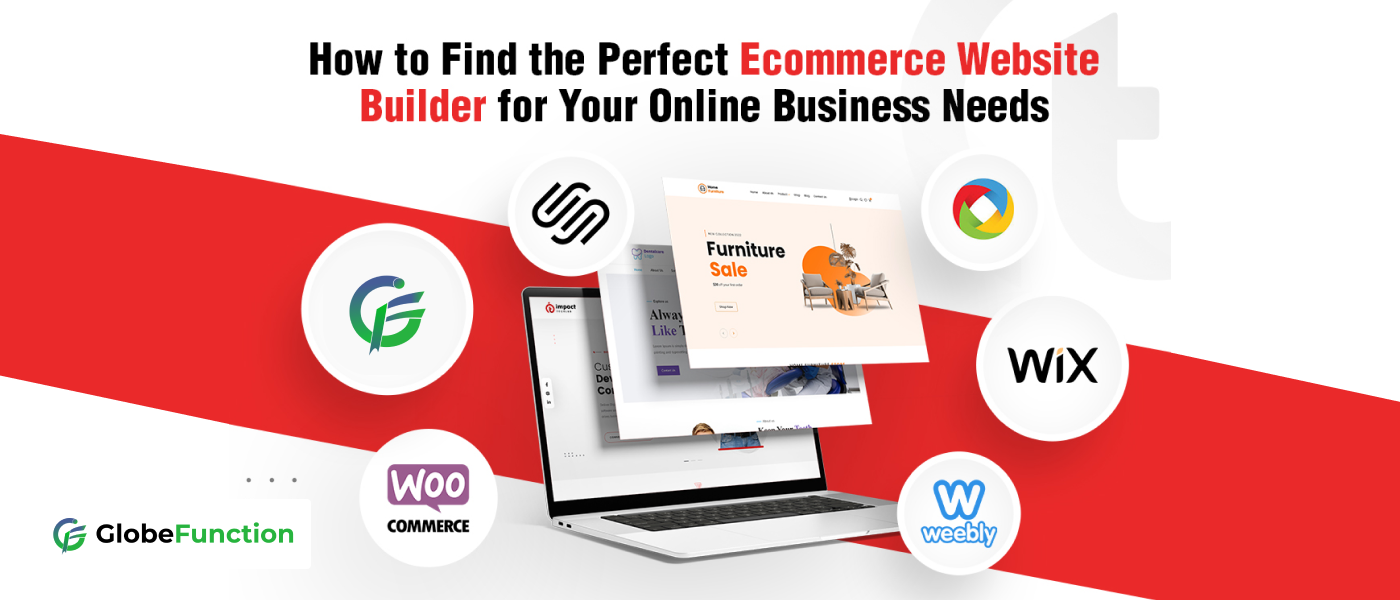Most people think that learning how to sell online will be hard and take a lot of time, but if you use the right Ecommerce website builder, you should be able to get started quickly and for very little money. Here are some tips and guidelines for selecting the ideal e-commerce platform for your products.
In this article, we’ll delve into the key aspects of selecting the best e-commerce website builder in India, including a rising star in the field: Globefunction.
E-commerce Websites' Importance for Small Businesses
Prior to delving into the particulars of selecting an e-commerce website builder, it is imperative to comprehend the reasons behind the significance of an online store for small businesses in India.
- Broader Reach: With the help of an e-commerce website, small businesses can reach clients throughout India and even beyond. Sales and brand awareness may rise dramatically as a result of this greater reach.
- Cost-effective: Traditional brick-and-mortar stores frequently have expensive overhead and rental fees. E-commerce websites cut costs and boost profit margins by doing away with the need for physical storefronts.
- Constant Accessibility: Online stores are always open to customers, in contrast to physical stores that have set business hours. Customers will find this accessible, and it increases the likelihood that sales will be made at any time of day.
- Data-Driven Insights: Online retailers can gain important knowledge about the tastes, behavior, and buying habits of their customers. One can use this data to improve product offerings and marketing strategies.
- Level Playing Field: Small businesses can now compete more fairly with larger companies thanks to e-commerce. No matter the size of the company, a well-designed website can convey professionalism and credibility.
Ecommerce Website Builders Should Have These Features:
1. The code is given; no coding is required; or coding is required
To set up your online store, templates are just the tip of the iceberg. You will need an option that eliminates all guesswork if you have no prior experience with websites or e-commerce. However, if you’ve been taught to code and you just want to take a few shortcuts, you want to be able to change the code whenever you want.
In either case, you’ll need to be able to use social media and other well-established online marketplaces to sell goods online across platforms. It ought to be feasible for you to oversee your merchandise and stock on each of your virtual shops.
2. How user-friendly is the website builder?
As you may know, the majority of website builders have the handy drag-and-drop feature. Easy-to-use e-commerce website builders are preferred by all. Because of this, using most platforms is a breeze. It’s important to remember, though, that usability typically falls on a spectrum determined by a combination of resources and expertise.
An e-commerce website builder should ideally be easy enough for non-techies to use. Different website builders may have varying degrees of ease of use, even though the best e-commerce website builders don’t require any coding experience.
Generally speaking, you want to select one that has both an easy-to-use editor and a drag-and-drop feature. It will be simpler to alter the different components of your website as a result. You might also think about other choices, like inline editing.
To avoid having to spend a lot of time figuring out how to use it, you should pick a platform that is easy to use and well-known for having a simple website editor.
In either case, you’ll need to be able to use social media and other well-established online marketplaces to sell goods online across platforms. It ought to be feasible for you to oversee your merchandise and stock on each of your virtual shops.
3. Simplicity of inventory control
Keeping track of inventory can be difficult, particularly for a craftsperson who wants to become an entrepreneur. Season by season and day by day, your offerings will change. It is essential to be able to handle inventory as it becomes available. Additionally, you ought to be able to manually modify your inventory to accommodate in-person sales at craft fairs and other events.
4. Price adjustments without transaction fees as needed
You should look for options that are scaled to your needs if you are just getting started, stepping up operations gradually, or only considering seasonal sales. You should not pay the same amount for selling 10 products online each month as you would for selling 100. Instead, look for adaptable web selling solutions that let you launch small and expand your offerings as your company expands.
Additionally, you ought to search for subscription-based solutions as opposed to transaction-based ones. Some platforms charge a transaction fee for each order that is processed, which encourages scalability. Although this may seem advantageous for a small number of transactions each month, as sales rise, these costs quickly mount up.
5. Adaptability to alter plans as circumstances change
E-commerce platforms shouldn’t pressure you into purchasing more than you actually need. However, avoid locking yourself into a package that doesn’t make sense in the long run. Having a platform that enables you to reduce your offerings during the off-season can save you hundreds of dollars if your offerings normally experience seasonal spikes.
Typical choices for processing payments
Never forget that you won’t succeed in the long run if it is difficult for your online customers to pay for your goods or services. As you may be aware, the majority of e-commerce sites accept payments through PayPal, Apple Pay, Square, and Stripe.
Therefore, when looking for the best ecommerce website builder, be sure to take into account the payment methods you are willing to accept.
There are numerous choices available when it comes to website builders. For this reason, deciding which features you want is essential, and then moving forward. Make use of this guide to assess the e-commerce platform you are thinking about and steer clear of the different mistakes many brands make when choosing their software. Keep in mind that developing your e-commerce website is just one aspect of the process; functionality is another.
Select payment processors that are beneficial to both you and your clients.
In either case, you’ll need to be able to use social media and other well-established online marketplaces to sell goods online across platforms. It ought to be feasible for you to oversee your merchandise and stock on each of your virtual shops.
6. Is it safe to use the website builder?
Security is one of the most important concerns in this digital age, and you should give it careful thought. Because doing business online involves a virtual interface, keep in mind that your customers place a high value on trust. It’s a fact that buyers want safe and secure payment methods because they have to divulge private information, like bank account information.
That’s the reason you need to make sure your e-commerce website builder complies with PCI standards. Additionally, keep in mind that selecting a web-based tool with built-in SSL encryption is now necessary to ensure security.
In either case, you’ll need to be able to use social media and other well-established online marketplaces to sell goods online across platforms. It ought to be feasible for you to oversee your merchandise and stock on each of your virtual shops.
7. Is there integration between the e-commerce website builder and marketing tools?
Website marketing is crucial for the expansion of any e-commerce company in this cutthroat market. For this reason, you require easy-to-use tools to market and advertise both your website and your business.
The top website builders for e-commerce will support your marketing efforts. Remember that you can accomplish this by making your content and website SEO-optimized, as well as by permitting or enabling the integration of different third-party marketing tools, like Google Ads. Could you, for instance, open your online store right now and begin selling on Amazon or Instagram?
Therefore, make sure the e-commerce website platform you select has strong and useful tools or easily connects with other marketing platforms that align with your channel requirements and strategy.
In either case, you’ll need to be able to use social media and other well-established online marketplaces to sell goods online across platforms. It ought to be feasible for you to oversee your merchandise and stock on each of your virtual shops.
8. Accessories and add-ons
Additionally, see if the app store is available for the e-commerce website builder you are thinking about. This is due to the possibility that customizing your page will require a variety of widgets. Additionally, confirm that third-party services and custom domains can be connected.
9. Product evaluations and rankings
If you shop online, you are aware that a lot of people place their trust in products based on the opinions of other customers. Thus, reviews and ratings for products, which were formerly thought of as optional features, are now required.
For this reason, one of the most important features that your online store builder needs to have is the ability to have ratings and reviews for products.
10. Integrations with third parties
This is still another important factor. Searching for an e-commerce platform that is compatible with the other systems you use is the best course of action. Additional services, like payment gateways, shopping cart functionality, tax calculation services, promotion tools, and reporting tools, are required if you want to open an online store. Major services will be compatible with the best e-commerce website builder.
In either case, you’ll need to be able to use social media and other well-established online marketplaces to sell goods online across platforms. It ought to be feasible for you to oversee your merchandise and stock on each of your virtual shops.
11. A simple checkout procedure
More than 55% of users exit websites at the cart, did you know that? And the reason for this is only that the checkout procedure is frequently difficult and drawn out. Therefore, you should check if an e-commerce website builder offers an easy-to-use checkout process before selecting one. There are website builders that allow you to personalize the checkout procedure.
Remember that an order summary is frequently included on the best checkout pages. Here, all you need to do is request the users’ basic information in order to process their payment. For a quicker checkout, find out if the website builder accepts a variety of payment options.
In either case, you’ll need to be able to use social media and other well-established online marketplaces to sell goods online across platforms. It ought to be feasible for you to oversee your merchandise and stock on each of your virtual shops.
How to Pick the Top Platform for E-Commerce
Acquiring online sales skills rapidly is half the fight, but your e-commerce platform ought to provide more than just a few slick, sector-specific website templates. Think about the services or tasks you can perform on your own, and then think about the ones you are genuinely willing to accept. Find a platform that satisfies the remaining requirements.
The following advice can also be used to your research on various e-commerce platforms.
Locate a feature comparison list for platforms and plans.
The top e-commerce services are very clear about the benefits of their offerings. A list of features for every particular plan or service option ought to be available. While charts are useful for comparing plans within and between platforms, the best websites also provide comparison charts that highlight their own features.
Look up genuine reviews written by real people online.
Determining an unbiased review can be challenging. The majority of websites that provide in-depth product reviews online are compensated to highlight particular e-commerce platforms. Regretfully, they can also be located the easiest.
By these websites, you can still obtain first-hand experiences. You can probably find reader comments at the bottom of the page if you scroll down. This is the greatest opportunity for you to read actual customer reviews for any web-based service platform.
View their demo
You most likely already know how you want to set up your online store if you’ve been considering how to sell online for some time. Not every platform will be suitable for your ideal online selling environment or your e-commerce business. See a demo of a platform’s core features before deciding to use it based only on reviews. Before you invest a lot of time and energy into trying to make it work, make sure it is a good fit.
Seek out the finest possible experience for your clients.
Check for reviews left by users who have shopped on these e-commerce platforms. Make sure the option you select facilitates browsing, ordering, and payment for your customers. The three primary domains to contemplate are:
- Checkout simplicity
- Safe checkout
- Adaptable modes of payment
Your customers will be satisfied with their online purchases as long as your website satisfies these three requirements and offers truthful and accurate product descriptions.
In either case, you’ll need to be able to use social media and other well-established online marketplaces to sell goods online across platforms. It ought to be feasible for you to oversee your merchandise and stock on each of your virtual shops.
India’s Leading E-Commerce Website Builders for Small Businesses
Now that you know what to search for in an e-commerce website builder, let’s examine some of the best choices that are offered in India:
1. Globefunction
need
2. The Shopify
A well-known e-commerce platform throughout the world, Shopify is renowned for its feature-rich features and user-friendliness. It provides an easy-to-use interface, a large selection of customizable templates, and a strong app store for extra features. Excellent scalability options and safe payment gateways are also offered by Shopify.
3. E-commerce Wix
Wix’s drag-and-drop website builder is well known for being user-friendly. It provides features and e-commerce templates tailored specifically for small businesses. Wix eCommerce offers mobile responsiveness and a smooth online store setup process.
4. Big-Commerce
BigCommerce is made to support companies of all sizes. It provides cutting-edge e-commerce capabilities, such as strong SEO tools and multi-channel selling. BigCommerce is renowned for its scalability, making it appropriate for companies intending to expand significantly.
5. The WooCommerce platform
WooCommerce is a great e-commerce plugin if your website is already built with WordPress. It offers many e-commerce features and integrates with WordPress seamlessly. WooCommerce comes with a ton of plugins and themes and is very customizable.
Conclusion
Small businesses in India need a trustworthy partner to help them succeed online in the quickly changing digital landscape. Globefunction has established itself as a driving force behind the success of these companies thanks to its creative approach to developing e-commerce websites. It provides small business owners with an intuitive, AI-powered, and adaptable platform that enables them to establish online stores that effectively reach their intended customer base. This best ecommerce website builder has never wavered in its dedication to helping small businesses in India expand, even as the e-commerce industry changes.
Frequently Asked Questions (FAQs)
Think about features like scalability, payment gateways, customization options, and ease of use when choosing a website builder for your online store. Make sure the platform fits your expansion objectives and business requirements.
While many website builders support e-commerce, some are specifically tailored for online selling. Platforms like Shopify, WooCommerce (for WordPress), and BigCommerce are popular choices due to their dedicated e-commerce features.
Look for website builders that support a variety of payment options, including credit cards, digital wallets, and other popular payment methods. Ensure the chosen platform is secure and compliant with online payment standards.
Mobile responsiveness is crucial, as a significant portion of online shoppers use mobile devices. Choose a website builder that ensures your e-commerce site functions seamlessly on smartphones and tablets.
Yes, SEO is crucial for visibility. Opt for a website builder with built-in SEO tools, allowing you to optimize product pages, meta tags, and URLs to improve your site’s search engine rankings.














